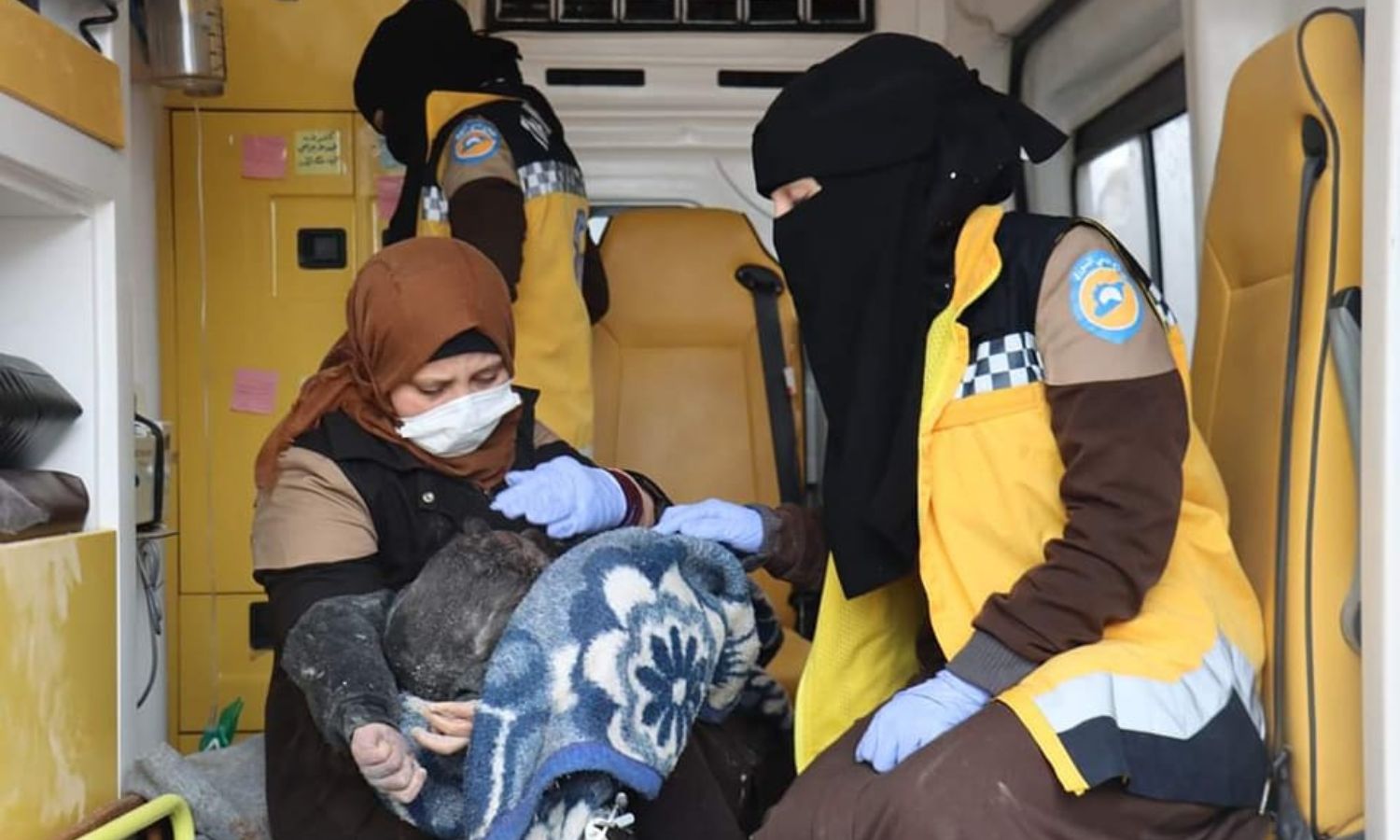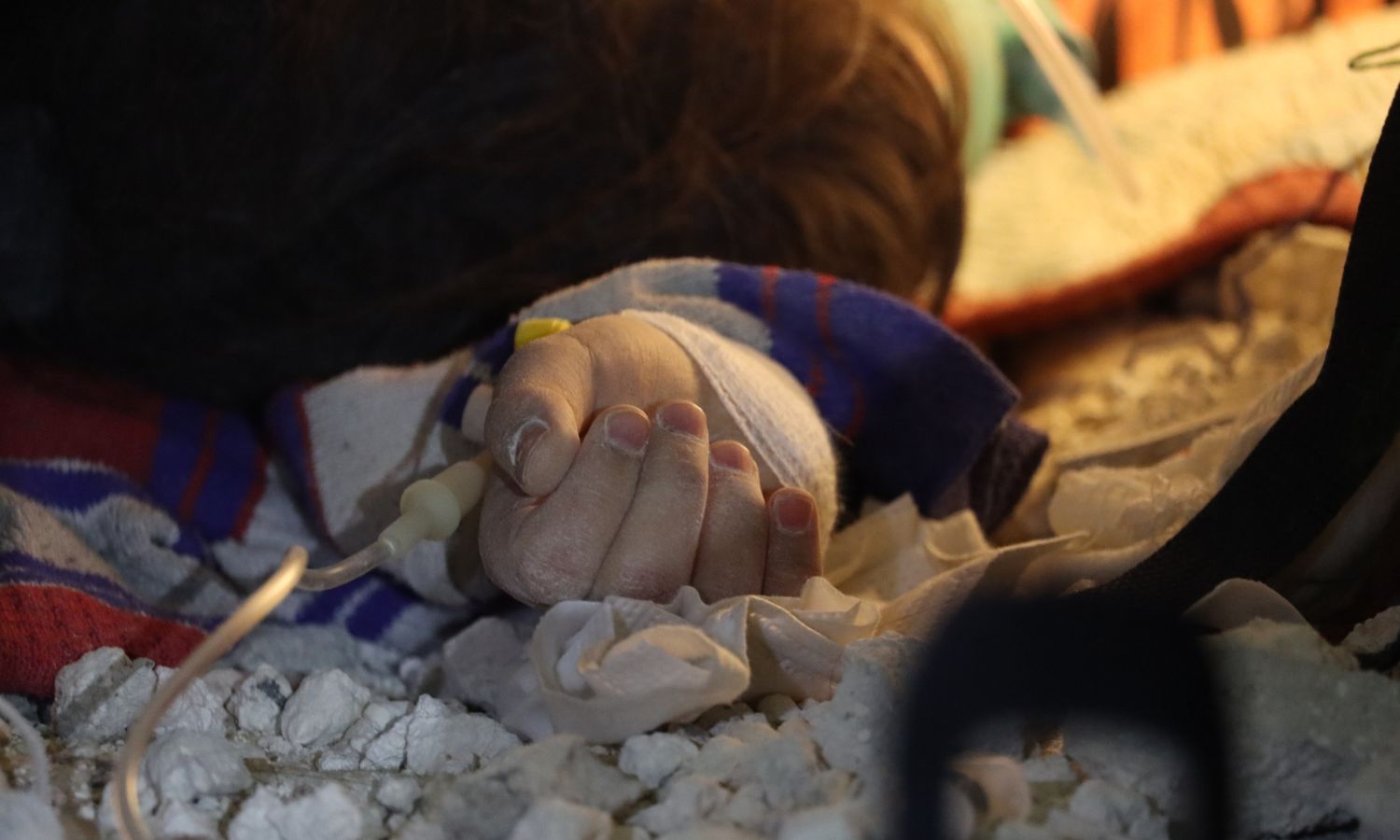



Enab Baladi – Hassan Ibrahim
“My sisters and my mother are dead inside.” The child, Elaph, answers the question of the rescue workers of the Syria Civil Defense (SCD) as soon as she was pulled out from under the rubble of her house in the city of Salqin in the northwestern countryside of Idlib on the first day of the earthquake that struck southern Turkey and four Syrian governorates on February 6.
The video of the child was circulated on social media and left its mark between the joy of her rescue and the grief for her family who perished in the devastating earthquake, with open questions about the future of the children who survived without their parents or missing a mother or father, and the disaster’s impact on them, which resulted in the death of 2,167 people and the injury of 2,950 others in northwestern Syria.
Images and videos of children who survived the earthquake were circulated on social media, accompanied by comments calling for them to be handed over to their families or real relatives, offers from people to take care of them, and warnings against “exploiters and ill-natured people” taking them from hospitals.
Elaph is one of the dozens of children who got out without their families from under the rubble. More than 50 hours after the earthquake occurred, the Civil Defense volunteers were able to rescue Ahmed and his sister from under the rubble of their house in the village of Millis in the northern countryside of Idlib on February 8.
The White Helmets described the story of their rescue as “legendary,” but it carried great pain as the two children lost their entire family under the rubble.
Moaz lost his mother and sister and survived with his father after they were rescued from under the rubble in the city of Sarmada, north of Idlib, more than 40 hours after the earthquake.
Likewise, Ahmed, 14, lost his father and three brothers and was left alone, and Bisan, 6, who lost her parents and six sisters, and Sondos, 8, who lost her parents and her twin sister, and was left alone with her aunt, and Sham, 7, got out after 40 hours from under the rubble, but she lost her mother and sister.
On February 9, the Molham Volunteering Team operating in northern Syria said that it had reached a surviving child who had lost his family, following suspicions that he had been removed from a hospital in an “illegal” manner after a search between hospitals.
The director of the Molham Team, Atef Nanoua, stated that the video recording he published of the child while he was on one of the beds inside the Afrin Hospital in the northern countryside of Aleppo received interaction from dozens of people who offered to take care of and adopt the child.
The recording also received interaction from some Turkish families who believed that it was their child, especially with the Turkish Health logo on the bed on which the child sat. However, after three days of searching, the child’s father was found, and he was handed over to him after he lost his mother and sister.

Sham’s little hand, who was trapped under the rubble in Armanaz town in Idlib countryside before being rescued by the Syria Civil Defense – February 7, 2023 (Facebook/Civil Defense)
The majority of the victims of the earthquake in northwestern Syria were women and children, without accurate statistics being available, with the continuation of search operations and the recovery of those trapped under the rubble of buildings, according to the Civil Defense.
Imad Zahran, the director of the media office in the Idlib Health Directorate, told Enab Baladi that many children have lost their parents and that many families have had one or two children escape from under the rubble, and humanitarian organizations and associations take care of them, not the Health Directorate.
Dr. Hussam Hamdan, the director of al-Shifa Hospital in the city of Afrin, north of Aleppo, told Enab Baladi that the hospital recorded three cases of children who lost their families and that their relatives arrived to identify them.
Two children were also referred to other medical centers due to their need for additional consultations, and one child is still in the hospital and is now under medical care.
Wafaa al-Jaish, a nurse at al-Shifa Hospital, told Enab Baladi that the hospital received many victims and those affected by the earthquake. Ambulance operations and responses were carried out by all cadres in accordance with the capabilities and capacity of the hospital.
Al-Jaish said that the hospital opened a section to receive children’s cases, as well as victims and deaths of unidentified children. Some families recognized their children, and the hospital sent some deaths of unidentified children to the Military Hospital after documenting them.
The commander-in-chief of Hayat Tahrir al-Sham (HTS), which has military influence in Idlib, Abu Mohammad al-Jolani, stated during a press conference on February 9 that any missing child’s name is circulated, and the concerned authorities are trying to bring the closest person to his/her family.
Al-Jolani explained that most of the cases of children without parents had relatives to recognize them, and in the event of some unidentified children, they will be directed to one of the institutions or orphanages in the region, pointing out that a team is currently working on counting the damages and human losses of the earthquake, including children.
Smooth faces that escaped death and emerged from under the rubble into the world, including those who laughed and those who were silent, and among them was the face of a child who sang “The Melody of Life.” She delivered a message of hope to the world, accompanied by heartburn and questions about the future life of small bodies that had lost the bosom of their families.
Lilas Dakhlallah, a researcher in social media science, explained that natural disasters are like wars and any difficult situation people experience, which leaves a very bad effect on the psyche, especially of children, and it is important to deal with children in an appropriate manner so that their psychological condition does not deteriorate.
Dakhlallah told Enab Baladi that children’s exposure to these conditions is followed by a disorder called “post-traumatic stress disorder,” and its symptoms include the child’s denial of his inner feelings and existing reality, lack of appetite, inability to sleep properly, and disturbing nightmares.
The child feels that life has stopped, meaning that it is impossible to think of being in a better place, with the loss of confidence in those around him and his vision of what surrounds him as frightening and sad, according to the researcher.
The child’s loss of his family in such cases is tragic, and he must be taken care of by those around him first, and then turned to the specialized authorities to take care of him, Dakhlallah added.
“The situation of a child without a family or one of the parents is critical because the state of instability will not be temporary and will change his life to a large extent, which makes him need more support, and it is necessary not to inform him of the death of his family directly, and preparations must be made for that.”
It is important for the child to feel safe and must calm him down and absorb his reactions from his surroundings, then resort to specialized authorities, whether in orphanages or others and if possible, obtain the help of a psychologist, the researcher said.
The United Nations Children’s Fund (UNICEF) said on February 6 that thousands of children are at risk after two earthquakes hit southern Turkey and areas in Syria.
Catherine Russell, the UNICEF Executive Director, said on her official Twitter account on February 6, “The images we’re seeing out of Syria and Türkiye are heart-wrenching. That the initial earthquake happened so early in the morning, when many children were fast asleep, made it even more dangerous, and the aftershocks bring continuing risks.”
She added that “Our immediate priority is to ensure children and families affected receive the support they so desperately need.”
Russell stated that children in Syria are still facing one of the most complex humanitarian situations in the world and that two-thirds of the population needs assistance in light of the worsening economic crisis, continued fighting, and mass displacement.
if you think the article contain wrong information or you have additional details Send Correction